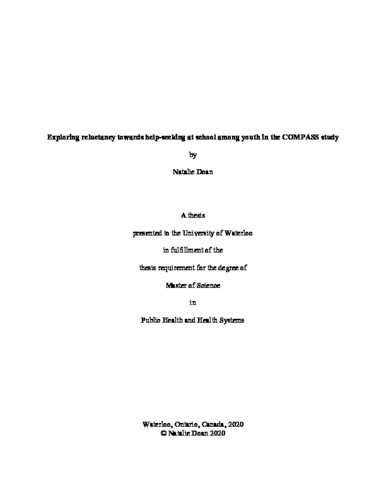| dc.description.abstract | Background: Despite the high prevalence of mental health problems that emerge during adolescence, it has been observed that young people are among the least likely to seek help. Considering that many adolescents spend most of their weekday waking hours at school, the school system has the potential to support positive mental health behaviours in students. Objectives: The goal of this thesis was to identify the student and school characteristics associated with a reluctancy towards help-seeking for mental health concerns at school. Specifically, the objectives of this study were to: (1) estimate the proportion of students reporting reluctance towards help-seeking at school; (2) identify the student and school characteristics associated with reporting reluctance towards help-seeking at school; and (3) examine whether social support moderates the relationships between the availability of school mental health professionals and services and help-seeking reluctance. Methods: Data from the 2018-2019 wave of the COMPASS study was examined. In total, 47,290 Grade 9 to 12 students attending 116 schools were included in the final analyses. GEE models were used to assess the student and school characteristics associated with attitudes towards help-seeking for mental health concerns at school. Results: Over half (58%) of students reported being reluctant towards help-seeking at school. Schools in a rural/small urban area had students reporting reluctancy towards help-seeking at a lower odds than medium/large urban schools (aOR = 0.85, 95% CI = 0.79, 0.93). When compared to schools in an area where the median household income was between $50,000-75,000, schools with a median income between $75,000-100,000 were at greater odds of students reporting reluctancy towards help-seeking (aOR = 1.20, 95% CI = 1,01, 1.43). Students who reported poorer mental health as indicated by self-rated mental health (aOR = 1.76, 95% CI = 1.65, 1.87), emotion regulation (aOR = 1.08, 95% CI = 1.07, 1.09), and flourishing (aOR = 0.96, 95% CI = 0.96, 0.97), family (aOR = 2.31, 95% CI = 2.16, 2.47), and peer support (aOR = 1.20, 95% CI = 1.13, 1.31), and school connectedness (aOR = 0.93, 95% CI = 0.92, 0.93) were at greater odds of being reluctant towards help-seeking at school than students who reported more favourable scores on these variables. The non-significant relationships between the availability of mental health professionals and services with help-seeking attitudes were not modified by social support. Conclusion: Many students reported being reluctant towards help-seeking at school. Few school and many student characteristics were associated with help-seeking attitudes at school among youth. This research provides important direction for future help-seeking interventions especially those targeting priority student populations. It is vital to further examine how school mental health strategies can be used to promote positive help-seeking attitudes among students. | en |

